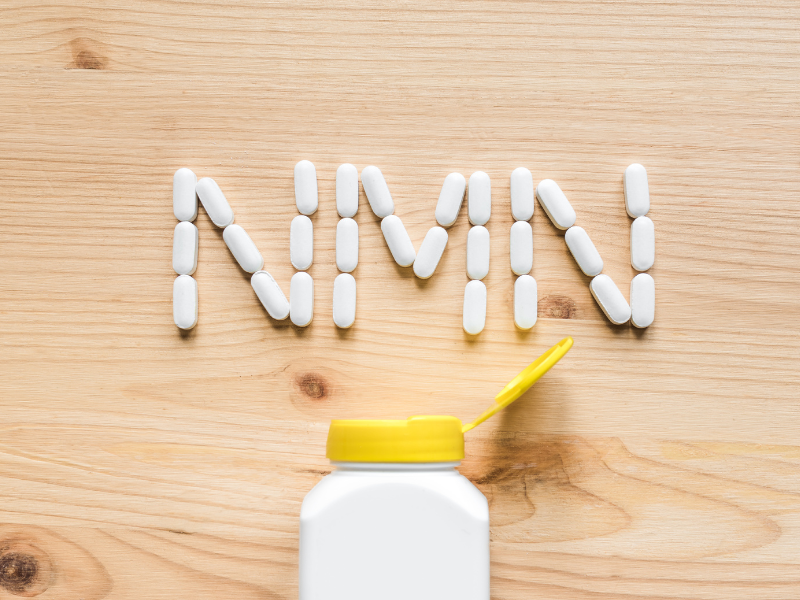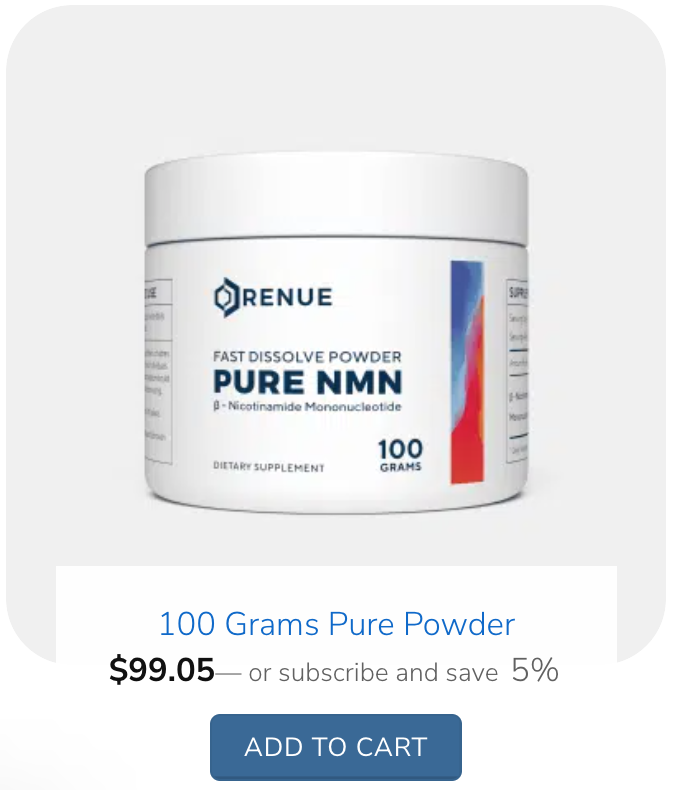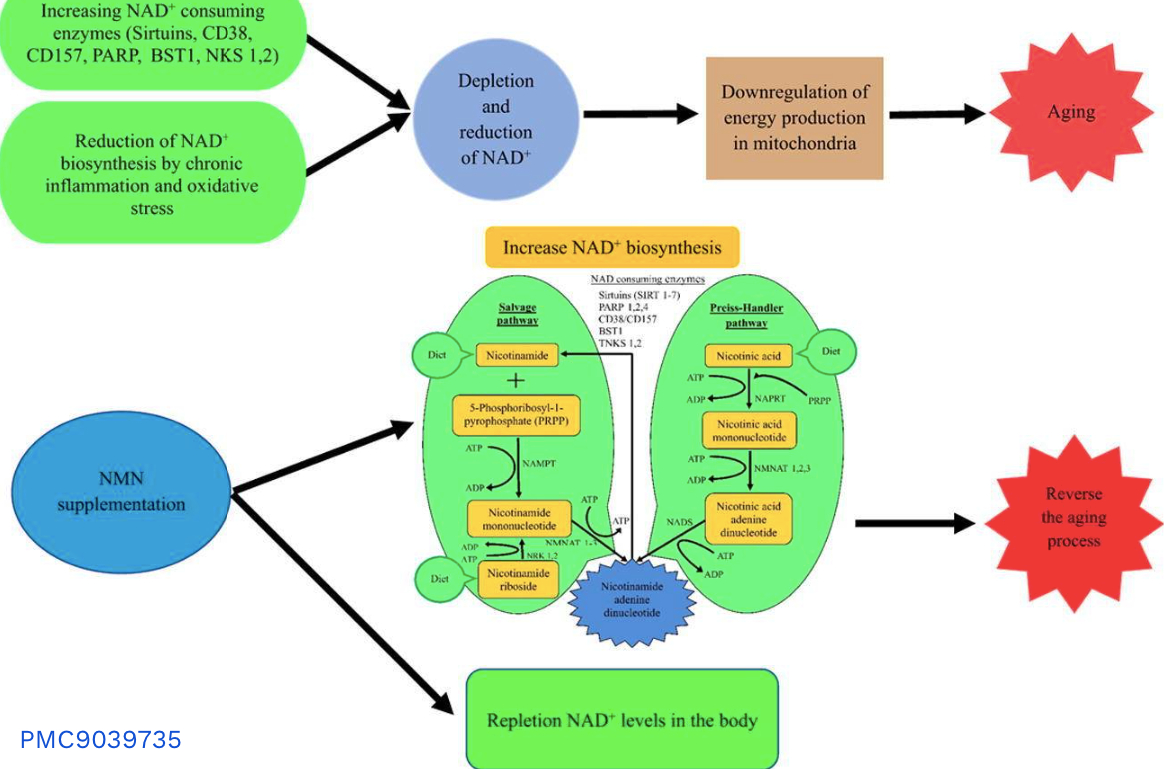
Secure Ordering | Free Shipping | 20% Off Retail Prices
Along with providing information on whether NMN (Nicotinamide mononucleotide) supplements might be right for you, this article also links to Fullscript where you can buy NMN supplements online through Fullscript’s secure healthcare formulary and get free shipping and 20% off the retail price of professional-grade supplements.
Nicotinamide Mononucleotide (NMN) is an NAD+ precursor. That means it gets converted into the critical molecule, NAD+, found in every cell of our bodies. NAD+ is vital for energy metabolism and signaling within the cell. As we age, NAD+ levels in our bodies decrease, leading to various aging-related health issues such as metabolic slowdown, decreased DNA repair, and cognitive decline. Research in animal models has shown that supplementation with NMN can boost NAD+ levels, thereby possibly reducing some of these aging-related issues. This article is focused on the role of the supplement, NMN in improving cellular energy production, DNA repair, reducing inflammation, and stimulating beneficial effects similar to those of calorie restriction, a known strategy for extending lifespan.
What Is Nicotinamide Mononucleotide (NMN)?
NMN is a precursor to an incredibly important energy molecule called NAD+. In other words, our bodies can convert NMN into NAD+. Nicotinamide mononucleotide (NMN) is a molecule that is naturally found in our bodies and in certain foods. NAD+ is the critical molecule needed for many cellular processes, such as energy production, DNA repair, and cell communication.
As we age, the levels of Nicotinamide Adenine Dinucleotide (NAD+), an essential coenzyme found in all living cells, tend to decrease significantly. This decline is more pronounced than many realize; estimates suggest that by the time people reach their 50s, their NAD+ levels may be only half of what they were in their 20s. This reduction has profound implications for health, as NAD+ is integral to numerous biological functions, including DNA repair, energy production, and the regulation of circadian rhythms. The decrease in NAD+ levels is therefore closely linked to various age-related health issues, such as diminished metabolic function, lower energy levels, and a reduced ability for cellular repair and maintenance, contributing to the overall aging process.
Research indicates that increasing levels of Nicotinamide Mononucleotide (NMN) offers a way to counteract this decline in NAD+. By supplementing with NMN, it’s possible to boost NAD+ levels, possibly reversing some of the negative effects associated with aging. This could lead to improvements in metabolic balance, energy production, and cellular health.
The stark contrast in NAD+ levels between people in their 20s and those in their 50s underscores the potential impact of NMN supplementation in promoting health and well-being in later years. As research evolves, the role of NMN in supporting healthy aging and preventing age-associated diseases becomes increasingly significant, pointing towards new strategies for maintaining vitality well into old age.
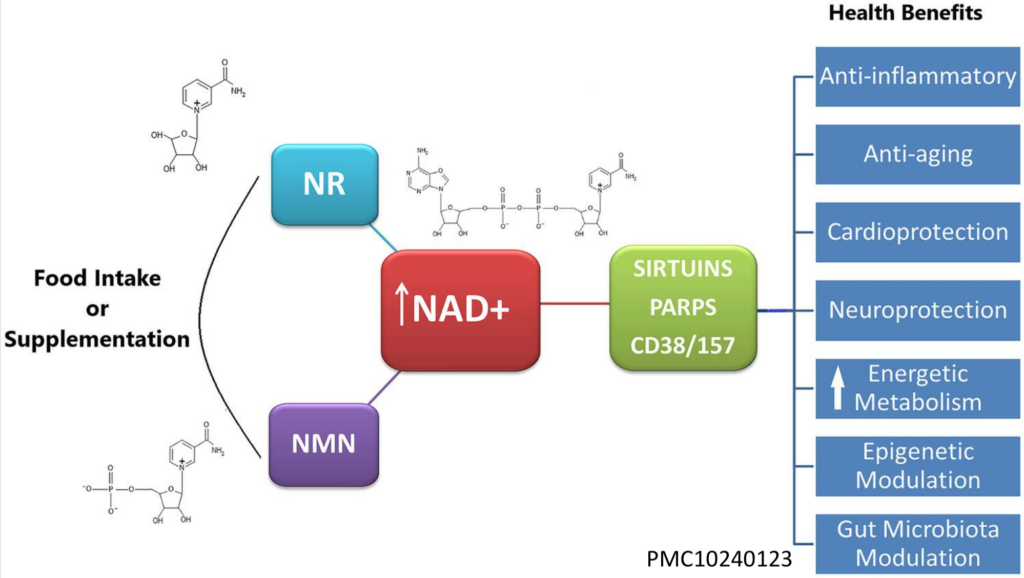
Scientists believe that NMN supplementation might have benefits in slowing down the aging process and improving age-related conditions, such as cardiovascular health, cognitive function, and energy levels. Of course, more research is needed, especially in human clinical trials, to fully understand the benefits and safety of NMN supplementation.
Some food sources that contain NMN include broccoli, avocado, tomatoes, and certain types of fish. However, the amount of NMN found in these foods is relatively small compared to what is used in research studies.
What Are the Benefits of Nicotinamide Mononucleotide (NMN)?
Here is a list of potential health benefits of Nicotinamide Mononucleotide (NMN) for our bodies:
- Energy production: NMN helps increase NAD+ levels, which supports the production of energy in our cells.
- Anti-aging: Some research suggests that NMN may slow down the aging process by boosting NAD+ levels and improving cellular function.
- Blood Pressure: Lower NAD+ levels are present in people with hypertension. NAD+ boosting therapy with 800 mg nicotinamide mononucleotide (NMN) supplement reduced BP and reduced vascular dysfunction in patients with high blood pressure. The researchers concluded that, “NAD+ boosting therapy can be used as a novel therapeutic strategy for the management of hypertensive patients.” [PMC10505611]
- Brain health: NMN might support cognitive function and protect brain cells from age-related damage. Nicotinamide mononucleotide (NMN) reduces the brain features of AD, including neuroinflammation, mitochondrial abnormalities, synaptic dysfunction, and cognitive impairment. It may do this by stimulating the gut microbiome to produce short-chain fatty acids that act as neurotransmitters. [PMID: 37271037]
- Heart health: Studies have shown that NMN can improve blood flow and overall heart function, potentially reducing the risk of heart disease.
- Diabetes and Fatty Liver: NMN may help regulate metabolism and improve insulin sensitivity, which can help manage blood sugar levels. [PMC6511662]
- Muscle function: Some research indicates that NMN may improve muscle strength and endurance, especially in older individuals. [PMC9158788]
- DNA repair: NMN supports DNA repair processes, which helps maintain the health of our cells and protect against age-related damage. [Watch This Video from Harvard University]
- Health Recovery After Chemotherapy. So far, this is only proven in mice, but there is great hope that NMN may help restore health in people who have had to undergo the massive physiological stress and body-wide cellular damage caused by chemotherapy. [PMID: 36611902]
The Deeper Science of NMN
Aging is the primary driver of multiple diseases including cancer, heart disease, metabolic disorders, and brain degeneration. At the heart of the aging process are the foundational cellular processes such as how our bodies sense and use nutrients, the roles of specific proteins and enzymes that control cell growth, energy levels, and the aging process.
NAD+ is a molecule that plays a central role in many cellular processes. Higher levels of NAD+ in cells can improve survival chances by increasing energy production and cell repair. Some people think of aging as a slow but unstoppable process that’s sparked by a drop in NAD+ production, causing a range of problems from DNA instability to mitochondrial dysfunction and more.
Within the mitochondria, NAD+ acts as a coenzyme involved in “redox” reactions. In these reactions, NAD+ accepts electrons and a proton to become NADH. This process is critical for Krebs cycle, where cells break down food molecules to produce ATP. Without NAD+ to carry electrons and facilitate this process, the production of ATP in the mitochondria would not be possible.
By the time we reach middle age, our NAD+ levels have fallen to half of what they were in our youth. Lots of studies show that increasing NAD+ levels can make cells more sensitive to insulin, improve mitochondrial function, and even lengthen lifespan. We can raise NAD+ levels by activating enzymes that help produce more NAD+, blocking an enzyme that breaks down NAD+, and taking supplements containing substances that our bodies can turn into NAD+, like nicotinamide riboside (NR) and nicotinamide mononucleotide (NMN).
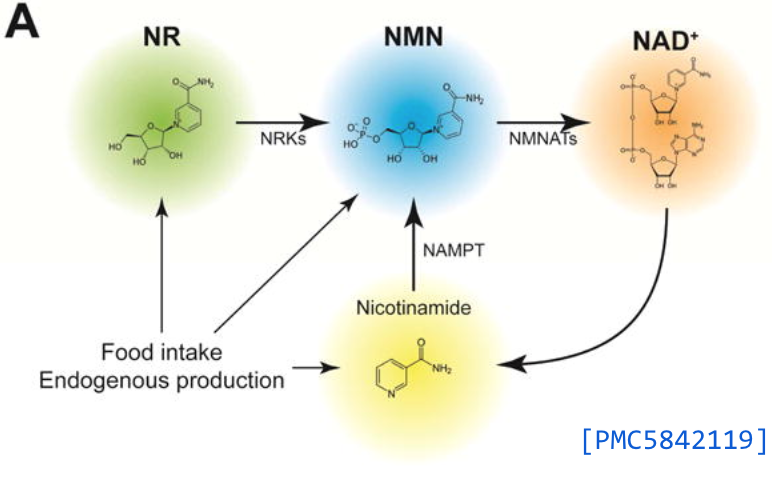
When you take NMN as a supplement, your body quickly absorbs it and converts it into NAD+. Many studies show that NMN supplementation can increase NAD+ production, reduce inflammation, improve insulin function, boost mitochondrial function, and improve brain function, among other benefits. This makes NMN a promising anti-aging supplement that could have a positive impact on many aspects of our health. [PMC5842119]
This graphic helps to visualize the molecular structures and the conversion pathways between Nicotinamide Riboside (NR), NMN, and Nicotinamide (a form of B3) as they are converted into the final key energy molecule NAD+.
NMN’s Effects on Sirtuins
NAD+ is an energy molecule that powers many important processes. One of the things NAD+ powers are proteins called sirtuins. Sirtuins are like the maintenance crew for our cells. They fix damage to our DNA, control inflammation, help manage stress, and even decide when a cell should die. Without NAD+, sirtuins can’t do their jobs properly.
So when we take NMN, it is converted it into NAD+, giving more “battery power” for the sirtuins. So more NMN means more NAD+, which means sirtuins can work better.
Aging is essentially the accumulation of damage in our cells over time. As we age, our levels of NAD+ naturally decrease, so our sirtuins can’t work as effectively, and the damage starts to pile up, leading to the signs of aging and age-related diseases.
By supplementing with NMN and boosting our NAD+ levels, we’re potentially helping our sirtuins work better. This could slow down the accumulation of cellular damage, potentially slowing down the aging process and reducing the risk of age-related diseases. But, of course, more research is needed to fully understand the benefits and potential risks.
SIRT1 Activators Magnify the Effect of NMN
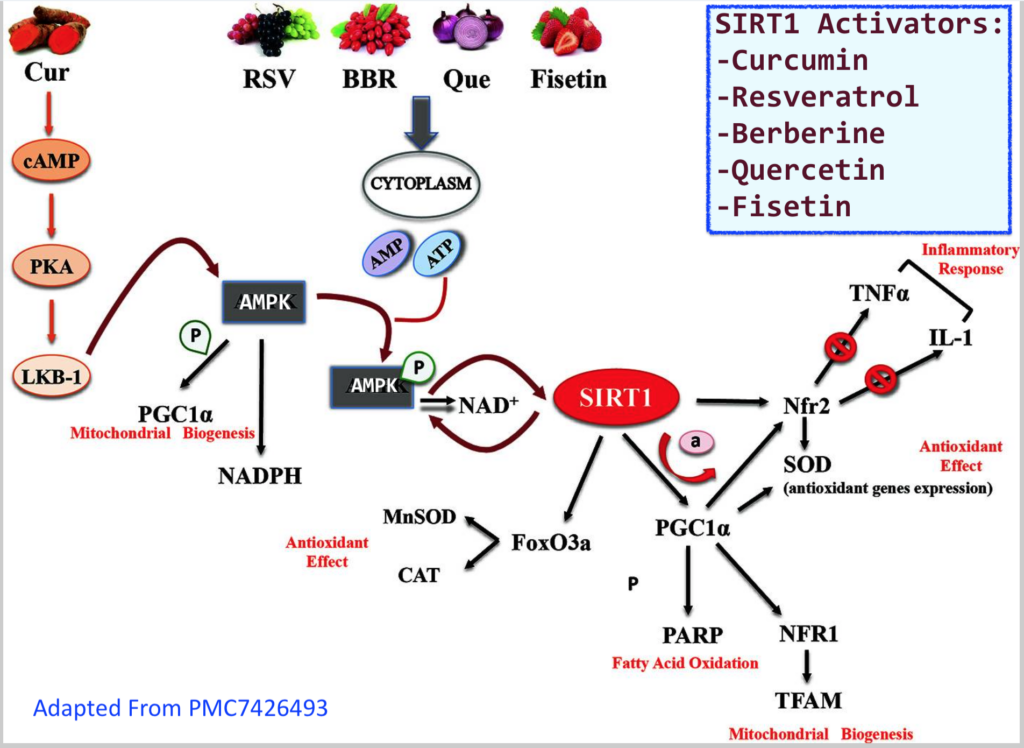
When NAD+ levels rise, sirtuin activity increases. The “magic” of NAD+ (which you can get more of by taking NMN supplements) is that NAD+ activates the sirtuin cellular repair genes.
NAD+ is necessary for sirtuin function. There are also sirtuin activators that, while they are not required for sirtuin function, they can stimulate sirtuin activity when present. These include:
- Metformin: Metformin can bind to and activate SIRT1 thereby promoting its activity. [PMC6232372]
- Exercise: Exercise is able to increase SIRT1 and SIRT3. [PMC6600260]
- Olive Oil: Olive Oil is a SIRT1 activator. Perhaps this is why it improves health so well. [PMID: 31432093]
- Curcumin, Resveratrol, Berberine, Quercetin, Fisetin: A number of plant compounds also activate SIRT1 including resveratrol, curcumin, berberine, quercetin, and fisetin. Of these, resveratrol is considered the most powerful activator. [PMID: 31432093]
How NMN Helps To Sprout New Blood Vessels
In a Video on the Harvard Medical School site, Dr. David Sinclair explains the effect of NMN on blood vessel regeneration in his research on mice. As we get older, one of the biggest changes that happen in our bodies is that the number of special cells, called endothelial cells that line the inside of our blood vessels, starts to drop. Also, the ones we do have don’t work as well as they used to.
These endothelial cells are super important because they keep our organs and tissues healthy. They do this by making sure we have tiny blood vessels in all the right places. These tiny blood vessels deliver oxygen and nutrients, help control body temperature, and carry away waste products.
The Vascular Theory of Aging
Now, according to a theory called the Vascular Theory of Aging, when these endothelial cells start to fail, it can cause a lot of the problems we usually associate with getting older and can lead to diseases common in old age. In other words, the theory suggests that our blood vessels’ health is a major player in how we age and the diseases we could develop as we get older.
Exercise is currently the best thing we have to slow down the aging effects on these tiny vessels by encouraging the growth of new ones. But, it’s a bit of a mystery why our bodies start to respond less to exercise as we age.
Our muscles are a good place to study this issue because they’re heavily affected by the aging process. As we age, our muscle cells die off more, the growth of new vessels slows down, and there’s an overall loss of blood vessels. This leads to loss of muscle mass and strength and a decrease in stamina in the later years of life, even if we exercise.
A crucial role in maintaining our health is played by an enzyme in our cells called SIRT1. SIRT1 needs NAD+ to function and is particularly important in our muscles where it helps create new blood vessels. As we age, the activity of SIRT1 may decrease, leading to a reduction in blood flow and stamina.
Sinclair’s Research: 56-80% Better Endurance In Mice
Sinclair’s study shows that by boosting SIRT1 activity using NMN, we can reverse these aging effects, increase the density of tiny blood vessels in our muscles, and improve exercise ability.
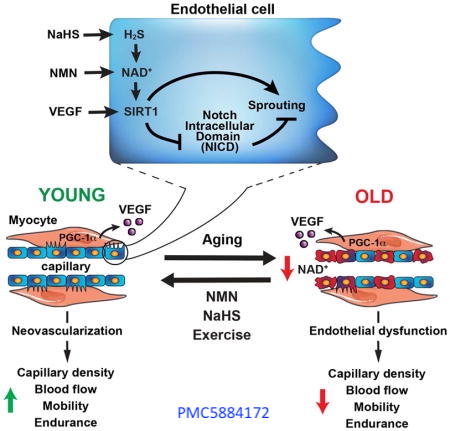
Specifically, NMN treatment managed to bring the number of tiny blood vessels in old mice back up to the levels usually seen in young mice. It also significantly improved blood flow at rest and oxygen levels in the muscle of treated mice compared to the control group.
The illustration shows that NMN acts on cells that are present in the blood vessel walls. These cells are capable of sprouting branches off the main blood vessels to create new blood vessels (capillaries) to feed oxygen and nutrients to tissues. So, to oversimplify, when these mice were given NMN, their NAD+ levels were increased, which activated SIRT1, which resulted in the sprouting of new blood vessels.
NMN supplementation noticeably increased oxygen consumption in the mice when they were at rest in their cages, but the most significant effect was a whopping 56–80% improvement in endurance, with lower levels of lactic acid after strenuous exercise after exercise. [PMC5884172]
Is Nicotinamide Mononucleotide (NMN) Safe?
Current research suggests that NMN is generally safe for consumption, with minimal reported side effects. Also, vast numbers of people take NMN supplements with minimal reported side effects, suggesting it is generally safe for consumption.
Medication Interactions With NMN
Research on how NMN interacts with other medications is limited, so there’s a lot we don’t know. However, NMN could interact with drugs that affect how our cells use energy. This could include specific diabetes medications like metformin, certain chemotherapies, and drugs that impact how our mitochondria, the powerhouses of our cells, function. It’s also possible that NMN could affect sirtuin proteins, but we need more research to say for sure.
Supplement Interactions with Nicotinamide Mononucleotide (NMN)
Although there is limited research on the interactions between Nicotinamide Mononucleotide (NMN) and other supplements, there are some theorized interactions where supplements may have related or complementary effects:
- Nicotinamide Riboside (NR): NR is another NAD+ precursor, similar to NMN, and they both serve the same purpose of raising NAD+ levels in the cells.
- Niacin and Nicotinamide: It is theorized that large amounts of these forms of Vitamin B3 may compete with the molecular pathways used by NR, thereby making NMN less of a benefit.
Food Sources of Nicotinamide Mononucleotide (NMN)
Although there is some NMN in various foods, it is extremely small compared to the doses used in research studies. What you can get through food is Vitamin B3 in the form of nicotinamide or nicotinic acid. These forms are not as effective at raising NAD+ levels as NMN.

When you purchase linked products presented on this page, Supplement Sciences, LLC receives affiliate fees so that our dietitians can continue to create great content.
Thank you for your support!
Order NMN
Dosage:
The optimal dosage of NMN for humans is still not well-established, and further research is needed to determine safe and effective dosages for specific health outcomes. The lowest effective dosage of NMN (Nicotinamide Mononucleotide) in studies can vary depending on the specific study and the desired outcome. However, some studies have suggested that even relatively low doses of NMN can have beneficial effects.
NMN was found to increase muscle insulin sensitivity in prediabetic women at a dose of 250 mg per day. [PMC8550608] The effects do seem to be dependent on dose with many people taking 500mg to 1000 mg per day for anti-aging benefits.
Avoid Fakes: 65% of NMN Supplements on The Major Online Marketplace Site
ProHealth Longevity published this article, in which they discuss their (2020-2021) investigation into adulterated and counterfeit NMN products sold on the major online marketplace site. They discovered that many of these products had fake Certificates of Authenticity and other documentation. Consumer Lab and other parties have now reported similar findings.
During their research, ProHealth Longevity found that more than half of the NMN products tested contained no NMN at all, while others had less than 80% purity. Some suppliers were selling low-cost vitamin B3 as NMN.
Consumer Lab tested the 21 NMN brands with the highest market share on this online marketplace and found that only three of the brands contained their claimed amounts of NMN. Consumer Lab notes that many of the products that contained virtually no NMN had hundreds or thousands of positive reviews on Amazon, raising questions about how those reviews were obtained.
These Are Trustworthy Sources For NMN
NMN (Nicotinamide mononucleotide)
Jarrow Formulas® Nicotinamide Mononucleotide (NMN) is an efficient precursor to the essential vitamin B3 metabolite, NAD+. NAD+ is essential to cellular energy production and mitochondrial function.* Levels of NAD+ decline with aging and high caloric intake, which can compromise mitochondrial function.* NAD+ is a required cofactor for sirtuins (SIRT), enzymes that promote healthy aging by regulating gene expression, DNA repair, mitochondrial biogenesis and energy metabolism.* Suggested Use: Take 1 to 2 tablets per day or as directed by your qualified healthcare professional.
Amount Per 1 Tablet Serving
NMN … 125mg (ß-Nicotinamide Mononucleotide)
NMN Powder or Capsules from Renue By Science
Renue By Science is one of a handful of trusted suppliers of NMN and a few of other anti-aging supplements. It offers NMN in the higher dosages (500-1000 mg) that many experts recommend.
When You Take NMN, You Need A Methylation Supplement
Supplementing with NMN increases NAD+ levels, which then break down into nicotinamide (Vitamin B3). This nicotinamide degradation can consume betaine (aka TMG), a key methyl donor. The reduced betaine levels could affect important processes like DNA methylation. So, if you’re taking NMN, adding a betaine supplement may help maintain your methylation health.
Adding betaine to your NMN supplementation routine can offer multiple benefits. Betaine, also known as Trimethylglycine (TMG), originally came from the beetroot plant. Betaine/TMG is a key player when it comes to donating methyl groups, which are essential for DNA methylation. The availability of methyl donors like betaine, methionine, and choline directly affects DNA methylation rates. Betaine also reduces inflammation by suppressing the activity of inflammatory markers like TNF-α, COX2, and NF-kB. [PMC9861325]
Although there is not enough research into the optimal dosage of betaine/TMG, many clinicians recommend TMG supplements be dosed in equal proportion to NMN, taking an equal number of milligrams of each.
Betaine TMG by BrainMD
Mood and Methyl Support* Betaine TMG provides betaine, also called trimethylglycine, which occurs naturally in the body and provides methyl groups that support genetic, epigenetic, and numerous metabolic life functions.* Betaine also can supplement the metabolic actions of SAMe (S-adenosylmethionine). Betaine TMG is a component of the comprehensive brain program developed by leading clinical neuroscientist Daniel Amen, MD. Enhances mood benefits of SAMe (S-adenosylmethionine)* Rich source of metabolically essential methyl groups* Supports metabolic recycling of homocysteine* Important protectant for cell water balance*
Suggested Use: Take 2 capsules daily between meals, to a maximum 6 capsules daily.
Amount Per 2 Capsule Serving
Betaine … 1000mg (Trimethylglycine)
TMG by Bio-Nutritional Formulas
TMG is a natural source of methyl groups. The process to detox homocysteine is called methylation, which depends on the presence of sufficient methyl donors. TMG donates one of its methyl groups to convert homocysteine to methionine, leaving beneficial Dimethylglycine (DMG) for energy support.*
Suggested Use:
Use 1 to 3 scoops (provided) daily with or between meals.
1 level scoop = 500mg
5 scoops = 1 teaspoon.
Food First!
Although this article discusses supplements in detail, don’t forget that we are absolutely committed to the “Food First” approach to nutrition. When it comes to your health, the totality of your eating habits far surpasses the impact of individual nutrients or any single supplement you consume. Even though this article doesn’t delve into the broader picture of your overall diet, it’s crucial to keep this element at the forefront of our minds. Your food needs to provide all the vitamins, minerals, fiber, and phytochemicals to nourish your body systems down to the cellular level.
Food choices, rather than supplements, are the most critical factors for a healthy gut microbiome. These trillions of tiny inhabitants in your gut affect your brain waves; they orchestrate your immune system. They possess the power to create molecules that can switch genes on or off and are even capable of synthesizing neurotransmitters. Opting for organic foods and steering clear of plastic packaging (including those labeled BPA-free) is a smart move to limit toxin exposure. The sum of all these parts leads to a powerful conclusion: the ultimate key to your health lies in the quality and balance of the food you consume. Supplements are secondary.
To Sum It Up
NMN supplements, short for Nicotinamide Mononucleotide, are powerful compounds that work by boosting levels of NAD+. NAD+ is a crucial molecule found in every cell of our bodies, which plays a key role in regulating our metabolism and energy production. Over time, NAD+ levels decrease, contributing to signs of aging and various health issues. By increasing NAD+ levels, NMN supplements aim to combat this process, thereby improving longevity and overall health. From enhancing energy and cognitive function to supporting heart health and metabolism, NMN supplementation offers promising benefits for those seeking a proactive approach to health and aging.
This Article is Not a Substitute for Medical Advice
Dietary supplements are not designed to diagnose, treat, cure, or prevent any disease. The Supplement Sciences website seeks to provide comprehensive access to the most relevant supplement information along with convenient online ordering. We do not provide medical advice and cannot guarantee that every product suggested is completely without risk. Since each person is unique in their health history and medication use, it is important to discuss supplements with your personal physician. Specifically, pregnant women and individuals being treated for cancer or liver or kidney problems must consult their physician about every nutritional supplement they plan to take. People taking medications for the treatment of HIV or with a history of organ transplant must not take supplements without consulting with their physician.
Diving Deeper Into the Research
NAD+ exhaustion by CD38 upregulation contributes to blood pressure elevation and vascular damage in hypertension
High blood pressure is often linked to two problems: the lining of the blood vessels not working properly and the blood vessels becoming stiff. These issues can lead to heart and blood vessel diseases caused by the buildup of plaque. NAD+, a crucial molecule found in all living cells, plays a significant role in many essential body functions. However, researchers had not yet really looked into how NAD+ levels might change in people with high blood pressure and how this could relate to the rise in blood pressure and damage to the blood vessels.
This study found that people with high blood pressure had lower levels of NAD+ in their blood and in the walls of their aorta, the main artery that carries blood from the heart to the rest of the body. This was linked to problems with how their blood vessels functioned. When researchers gave these patients with high blood pressure 800 mg (NMN) to increase their NAD+ levels, their blood pressure went down, and their blood vessel health improved.
A molecule called CD38, which is found in the cells lining the blood vessels, plays a big role in using up NAD+ when it becomes overactive. This overactivity is driven by an increase in inflammatory cells and a protein called IL-1β, which in turn is produced by these inflammatory cells. When researchers inhibited CD38 or genetically dialed down its activity in mice with high blood pressure, their blood pressure decreased, and their blood vessels functioned better.
This study showed for the first time that activation of CD38 in the blood vessel lining, leading to faster NAD+ breakdown because of more IL-1β from inflammatory cells, is a key reason for increased blood pressure and blood vessel damage in high blood pressure conditions. By boosting NAD+ levels, we might have a new way to treat high blood pressure. [PMC10505611]
A YouTube Video explains more of the details of the study.
There’s growing evidence that NMN could improve mitochondrial function, metabolism, and heart health, offering a more holistic approach to aging well. While more research in humans is needed, NMN supplements could offer hope for promoting a longer, healthier life in the future. PMC9039735

 Scan Me!
Scan Me!
